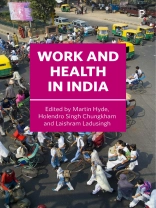The rapid economic growth of the past few decades has radically transformed India’s labour market, bringing millions of former agricultural workers into manufacturing industries, and, more recently, the expanding service industries, such as call centres and IT companies.
Alongside this employment shift has come a change in health and health problems, as communicable diseases have become less common, while non-communicable diseases, like cardiovascular problems, and mental health issues such as stress, have increased.
This interdisciplinary work connects those two trends to offer an analysis of the impact of working conditions on the health of Indian workers that is unprecedented in scope and depth.
Spis treści
Introduction: Work, stress and health in India ~ Martin Hyde, Holendro Singh Chungkham, Laishram Ladusingh
Work, stress and health: Theories and models ~ Linda Magnusson-Hansson, Martin Hyde, Holendro Singh Chungkham & Hugo Westerlund
Work environment, health and the international development agenda ~ Martin Hyde and Tores Theorell
Employment trends in India: Some issues for investigation ~ A.V.Jose
Rural-urban and gender differences in time spent in unpaid household work in India ~ Laishram Ladusingh
Activity status, morbidity patterns and hospitalisation in India ~ Harihar Sahoo
Occupational class and chronic diseases in India ~ Sanjay K. Mohanty and Anshul Kastor
Stress and health among the Indian police ~ Vaijayanthee Kumar and T.J. Kamalanabhan
Health status and lifestyle of the Oraon tea garden labourers of Jalpaiguri district, West Bengal ~ Subrata K. Roy and Tanaya Kundu Chowdhury
The role of work-family support factors in helping individuals achieve work-family balance in India ~ Sarlaksha Ganesh and M.P.Ganesh
Working conditions, health and well-being among the scavenger community ~ Vimal Kumar
Lessons and future research directions from work environment research in India ~ Martin Hyde, Holendro Singh Chungkham, Laishram Ladusingh
O autorze
Laishram Ladusingh is Professor in and Head of the Department of Mathematical Demography and Statistics at the International Institute for Population Sciences in Mumbai. He has written extensively on demographic issues.












